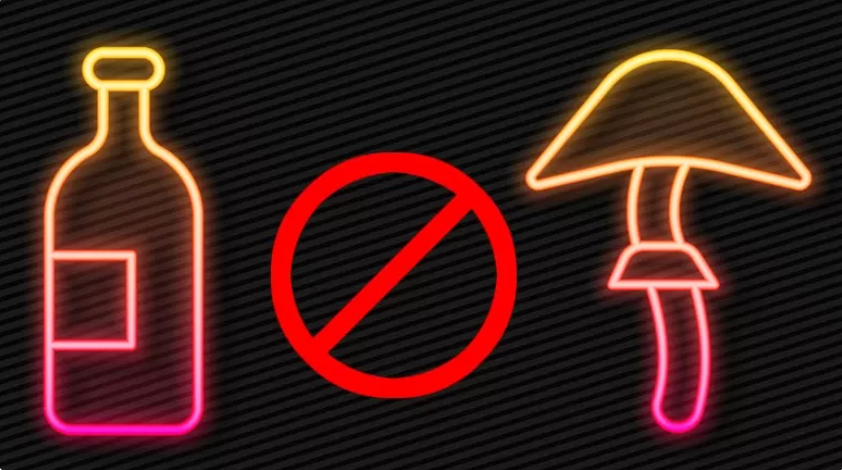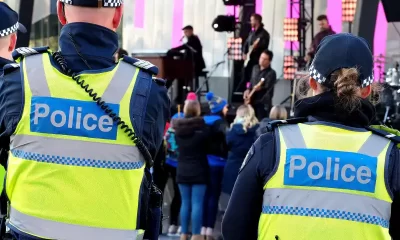Reports
Can Psychedelics Help Alcoholics Quit Booze? New Studies Just Released on Psilocybin and Alcoholism

Can alcoholics get help and quit alcohol with the use of mushrooms and psychedelics?
Courtesy of the pandemic, the need for adequate treatments for alcohol addiction has become pressing more than ever before. According to a major study published earlier this year, it was discovered that alcohol-related deaths increased during the pandemic. A total of 99,000 alcohol-related deaths were recorded in 2020 which when compared to the previous year, increased by 25%. This figure indicates that more non-senior adults died from alcohol than Covid in 2020.
Frankly, this public health situation isn’t new — alcohol consumption and addiction have seen an exponential increase in the U.S for many years now. Between 1999 and 2017, alcohol-related deaths increased by 100% a major reason life expectancy reduced during that period. Nonetheless, adequate treatments still prove tricky. But as it stands Ralph Gerber and several other scientists and therapists believe that psychedelic can work their magic in alcohol addiction.
From the latest report, approximately 15 million adults living in America battle with alcohol addiction. Many have tried but failed to find an effective therapeutic approach to solving their addiction. However, Gerber has always been raving about psychedelics and their emotional effects which helped him conquer his alcohol addiction. Now, for the very first time, an international multidisciplinary collaboration has revealed a similar mechanism behind the psychedelic treatment.
The International Multidisciplinary Research
Spearheaded by a neurobiologist from the Central Institute of Mental Health, Marcus Meinhardt, the researchers discovered how psilocybin repairs the brain’s molecular circuits in alcohol addicts. Hence, helps to reduce relapses.
A lot of people addicted to cocaine, nicotine, and alcohol exhibit injury of mGluR2, a certain glutamate receptor. In simple terms, Meinhardt defines the mGluR2 as an antenna that receives brain signals. When these signals are not received or processed, humans begin to exhibit specific behavioral patterns like alcohol craving. However, with psilocybin, Meinhardt believes the reception can be repaired and functional again.
From the experiment, Meinhardt made use of a single dose of psilocybin on rodents which was sufficient to alter their behavior. If the experimental results can be reproduced in humans, it would prove to be a big breakthrough in addiction therapy. Considering a lot of adults take daily prescription pills, the use of psilocybin would be considered a great success.
However, there’s the need to carry out more research to determine the lasting effect of psilocybin and any side effects on the brain. In fact, there are so many questions still left unanswered which satisfactory answers must be given before psilocybin is legalized for medical use.
To provide answers to these questions, Meinhardt is looking forward to kicking off human trials in his next study. To provide all the tools and information Meinhardt needs, his university has been in collaboration with three others in Italy, France, and Switzerland since 2018. The focus has primarily been on discovering the prospect of psilocybin in alcohol addiction.
The Core Research
In the human trial, 60 alcoholic patients were gathered to study psilocybin’s effects on alcohol addiction. The study was kicked off by one of Meinhardt’s colleagues, a neuropsychologist from Zürich University, Katrin Preller. Even though the results are yet to be published, she affirmed that they were very promising. Before this trial on alcohol addicts, she had previously run similar trials on depressive patients which were very successful. She believes the result on alcohol addicts have similar results as they draw up to a close of the study.
However, she clearly admits that even with her experience in the field, there’s still much to learn about the effects of psychedelics on the brain. She went on to say that before one can conclude on effective therapy, there’s the need for bigger and more controlled research. But the reality is that it is very difficult to carry out such research in the last 3 decades. Besides, one of the issues with psychedelics is that patients can always tell if they got the real deal or placebos.
Meanwhile, distinguished universities like UCLA, Yale, and Johns Hopkins School of Medicine have confirmed initial signs of success that suggest the positive lasting changes of psychedelics.
According to Roland Griffiths in an interview with Scientific American, one of the incredible features of researching psychedelics is their potential transdiagnostic applicability. Griffiths has been involved with several psychedelic research that evaluated psilocybin for the treatment of depression, alcohol, and nicotine addiction. At John Hopkins, about two-thirds of the patients treated with psilocybin described the experience as a meaningful one.
Is legalization too soon or not?
At the moment, cities like Washington, D.C, Oakland, and Denver have legalized the use of psychedelics for medical use, and several states (California for instance), have announced to follow suit. Nonetheless, the drug stays illegal under federal statute. In Switzerland, doctors can also call for compassionate usage of psychedelics for addiction, post-traumatic stress, and depression.
Definitely, in times past, psilocybin and LSD were hailed as miracle cures especially when Timothy Leary, a Harvard psychologist inspired his followers to use psychedelics. Now, several old psychedelic gurus are restarting the research that took place in the 60s but with a focus on medicinal use rather than spirituality. With the establishment of MAPS, Rick Doblin has now discovered a huge passage for legalization with the research looking for arguments to change the laws.
While Meinhardt is well aware of both new and old research, he’s not willing to raise public expectations. Meinhardt believes that users and scientists working on psychedelics were too ecstatic back then which was why they went underground when LSD was made illegal in the 70s causing funding to stop. He went on to say that such mistakes must be learned from and researchers should focus on research and reach a solid conclusion before thinking about legalization.
After all, while the hype around psychedelics continues to increase, they are not without risks. Psychedelics are known to initiate psychosis, irregular heartbeat, and high blood pressure. As a result, much of the present research does not include patients with hypertension, schizophrenia, or heart issues. Besides, well-curated experimental repeatedly different from supervised use of psychedelics at festivals or parties.
Conclusion
Presently, more people are asking for psychedelic legalization especially as alcoholism becomes rampant, sending people to an early grave. Apart from that, the nonnonaddictiveture of psilocybin has also made it gain attention among American citizens. Now with psilocybin being linked with helping to treat alcohol addiction, its popularity and use can be said to continuously increase.
Business
Pot Odor Does Not Justify Probable Cause for Vehicle Searches, Minnesota Court Affirms

The Minnesota Supreme Court affirmed that cannabis odor does not constitute probable cause to search a vehicle.
If Minnesota police search a vehicle solely based upon the smell of pot, they can’t justify searching a vehicle, even if there is evidence found of other alleged crimes. Even after appealing a lower court decision to suppress the evidence—twice—the Minnesota Supreme Court agreed, and the dismissal of his charges stands.
In a ruling filed regarding a case the State of Minnesota Court of Appeals on Sept. 13, the Minnesota Supreme Court affirmed that cannabis odor does not constitute probable cause to search a vehicle.
The case has been ongoing for two years. On July 5, 2021, just before 10 p.m., a Litchfield police officer stopped a car for an obscure local law: the light bar mounted on the vehicle’s grill had more auxiliary driving lights than are permitted under Minnesota law. The officer asked the driver, Adam Lloyd Torgerson, for his license and registration. Torgerson, his wife, and his child were present in the vehicle. The officer stated that he smelled pot and asked Torgerson if there was any reason for the odor, which he initially denied. But cops found a lot more than just pot.
A backup officer was called in. The couple denied possessing any pot, but Torgerson admitted to smoking weed in the past. The second officer stated that the weed odor gave them probable cause to search the vehicle and ordered them to exit the vehicle. The first officer searched the vehicle and found a film canister, three pipes, and a small plastic bag in the center console. The plastic bag contained a white powder and the film canister contained meth, which was confirmed in a field test.
Torgenson was charged with possession of meth pipe in the presence of a minor and fifth-degree possession of a controlled substance after the unwarranted search of Torgerson’s vehicle.
Police Aren’t Allowed to Do That, Multiple Courts Rule
But the search had one major problem—cops weren’t searching for a meth pipe. They only searched his car because they could smell pot, and the meth and paraphernalia were a surprise for everyone. Still, they had no grounds to search the vehicle. The man’s charges were later dismissed after the district court determined the odor of cannabis alone was insufficient basis for probable cause to search the vehicle, regardless of whatever other drug paraphernalia they found.
The state appealed the case, but the Minnesota Court of Appeals affirmed the district court’s decision. The case was appealed a second time, this time to the Minnesota Supreme Court, which agreed with the lower court’s ruling.
“This search was justified only by the odor of marijuana emanating from the vehicle,” the Minnesota Supreme Court decision reads. “Torgerson moved to suppress the evidence found during the search, arguing that the odor of marijuana, alone, is insufficient to create the requisite probable cause to search a vehicle under the automobile exception to the warrant requirement. The district court granted Torgerson’s motion, suppressed the evidence, and dismissed the complaint. The State appealed. The court of appeals affirmed the district court’s suppression order. Because we conclude that the odor of marijuana emanating from a vehicle, alone, is insufficient to create the requisite probable cause to search a vehicle under the automobile exception to the warrant requirement, we affirm.”
It amounts to basic human rights that apply—regardless of whether or not a person is addicted to drugs.
Other States do Precisely the Same Regarding Pot Odor as Probably Cause
An Illinois judge ruled in 2021 that the odor of cannabis is not sufficient grounds for police to search a vehicle without a warrant during a traffic stop.
Daniel J. Dalton, Associate Judge of the 14th Judicial Circuit, issued a ruling in response to a motion to suppress evidence in the case of Vincent Molina, a medical cannabis patient arrested for cannabis possession last year.
In that case, Molina was arrested despite the decriminalization of small amounts of cannabis in Illinois in 2019 with the passage of the Illinois Cannabis Regulation and Tax Act.
In some states, the issue of probable cause and cannabis was defined through bills.
Last April, the Maryland House of Delegates approved a bill that reduces the penalties for public cannabis consumption and bars police from using the odor of cannabis as the basis for the search of an individual or auto. Under Maryland’s House Bill 1071, law enforcement officers would be prohibited from using the odor of raw or burnt cannabis as probable cause to search a person or vehicle.
The rulings represent the rights of citizens when they are pulled over by police, even if there are hard drugs involved.
Business
Legal Marijuana Handed A Nothing Burger From NY State

Following the chaos of the recreational weed rollout, the government is trying to figure out next steps. But it seems legal marijuana has been handed a nothing burger from NY state with their last rollout for potential cannabis retailers.. With an estimated $3.5 billion in sales at stake along with tax revenue for the state’s every growing budget, the fumble is costly for a significant number of players. And it has been a huge loss for the marijuana industry as a whole.
What was quickly seen as an opportunity was pounced on in the city with the most billionaires globally along with endless big and small entrepreneurs, and hustlers. Seeing a huge amount of cash on the table, players acted in a quickly in a way bureaucrats will never understand.
Embracing a Wild West approach, officials decriminalizated and fumbled licensed legalization of sales. Despite promises and initial outlines where existing medical marijuana dispensaries could switch to recreational and a fair, for government quick liscnese process, the state tossed it all in one stroke. In a vision of equity, officials decided to reserve the first retail licenses for felons and other “justice-involved” individuals. Lawsuits started, the desired licensees struggled to raise capital and over 1,600 unlicensed retail stores opened in NYC. For the small time players, they have set sidewalk card tables parks, selling roll-ups and handmade marijuana edibles, in full view of the police.
The updated systems was rolled out, but has left people confused, dispirited, and disappointed. The Office of Cannabis Management rolled out the previous Conditional Adult-Use Retail Dispensaries (CAURD) program with high hopes. Now, regulators voted to allow the state’s medical marijuana operators to apply for adult-use retail licenses. Multistate operators who have patiently acquired a majority of the state’s 10 registered organization.
“It was more like an orgy of minimalism. While they are getting ready to open the application window on October 4th (notably, originally it wasn’t intended to be a 60-day window, but rolling applications) for most license types (sans on-site consumption and delivery), they refused to address the CAURD program. Other than to suggest that it remains “a priority”, they have offered only some subtle hints in the guidance to the regulations. These include establishing a priority for retail applications which include secured real estate, which will be given priority after the initial 30-days of the 60-day application window have passed (although they do not define what that means). And noting that existing licensees may apply for an additional license so long as they comply with the rules of a two-tier system. The positive news is that these statements can be interpreted as an invitation to current CAURD licensees, many of whom will also meet other Social and Economic Equity (SEE) criteria entitling them to an additional priority.” shares Andrew Cooper, partner at Falcon Rappaport & Berkman LLP, one of the top cannabis law firms.
Unfortunately, there are multiple losers in the state’s unique approach. One is consumer and medical marijuana patients, including veterans. The unlicensed dispensaries are making a mint and overcharging customers due to high demand. Small investors and companies, including those who could be a player in the CAURD, will not have the financial to compete with multi-state and large players. And taxpayers will lose out for years to come as revue it lost to unlicensed dispensaries.
The good news, consumers will continue to find products easily over the next few years. There is even a thriving unlicensed dispensary a few blocks from City Hall.
While New York is awash with billionaires, fashion, food and smarts, common sense seems to be lack for making a good government plan.
Source: https://thefreshtoast.com/cannabis/legal-marijuana-handed-a-nothing-burger-from-ny-state/
Healthcare
This Activity Helps Those With Depression And Anxiety

A new study shows that exercise is extremely helpful for people coping with a mental health condition, affecting them more than people who don’t share these struggles.
One of the activities that people first recommend when discussing conditions like depression and anxiety is exercise. The suggestion is so pervasive that it’s almost a cliche by now. Still, evidence shows that exercise is incredibly helpful for your mental health, decreasing muscle tension, promoting the production of serotonin, and more.
A British study suggests that people with depression and anxiety are twice as likely to reap the benefits of exercise when compared to people who don’t suffer from these conditions.
The data was obtained by tracking the exercise patterns of over 50,000 people in their late fifties. About a third of them were affected by health conditions like depression and anxiety. While everyone experienced benefits from moderate amounts of exercise, people who had a mental health condition experienced 22 percent less risk of having a heart attack or a blocked coronary artery. For reference purposes, the majority of candidates only experienced a 17 percent decrease in their odds of suffering from a cardiac condition.
“The effect of physical activity on the brain’s stress response may be particularly relevant in those with stress-related psychiatric conditions. This is not to suggest that exercise is only effective in those with depression or anxiety, but we found that these patients seem to derive a greater cardiovascular benefit from physical activity,” said the lead researcher of the study, Hadil Zureigat.
Anxiety and other forms of stress can result in inflammation, a condition that creates risks for people’s circulatory systems. The effect of exercise targets different risk factors for people with an existing mental health condition, reducing the cortisol in their bodies and increasing cardiovascular health, all the while producing serotonin and boosting their moods.
Introducing a workout routine into your life when you don’t have one isn’t easy, but it’s often suggested to start off slow, taking your time to find an activity you find enjoyable. Just one exercise session can make you feel better, but the more you commit to it, the easier it gets to create a habit. Try working out with friends, outdoors, signing up to sports or classes — whatever keeps you accountable, and returning to your activity.
Source: https://thefreshtoast.com/news/this-activity-helps-those-with-depression-and-anxiety/
-

 Business2 years ago
Business2 years agoPot Odor Does Not Justify Probable Cause for Vehicle Searches, Minnesota Court Affirms
-

 Business2 years ago
Business2 years agoNew Mexico cannabis operator fined, loses license for alleged BioTrack fraud
-

 Business2 years ago
Business2 years agoAlabama to make another attempt Dec. 1 to award medical cannabis licenses
-

 Business2 years ago
Business2 years agoWashington State Pays Out $9.4 Million in Refunds Relating to Drug Convictions
-

 Business2 years ago
Business2 years agoMarijuana companies suing US attorney general in federal prohibition challenge
-

 Business2 years ago
Business2 years agoLegal Marijuana Handed A Nothing Burger From NY State
-

 Business2 years ago
Business2 years agoCan Cannabis Help Seasonal Depression
-

 Blogs2 years ago
Blogs2 years agoCannabis Art Is Flourishing On Etsy













